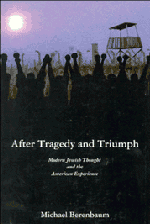Book contents
- Frontmatter
- Contents
- Foreword
- Introduction
- PART I THE HOLOCAUST IN CONTEMPORARY AMERICAN CULTURE
- PART II JEWISH THOUGHT AND MODERN HISTORY
- 8 Franz Rosenzweig and Martin Buber Reconsidered
- 9 The Problem of Pluralism in Contemporary Orthodoxy: Philosophy and Politics
- 10 From Auschwitz to Oslo: The Journey of Elie Wiesel
- 11 Jacob Neusner and the Renewal of an Ever-Dying People
- 12 Political Zionism's Would-Be Successors: Sectarianism, Messianism, Nationalism, and Secularism
- 13 The Situation of the American Jew
- Notes
- Index
8 - Franz Rosenzweig and Martin Buber Reconsidered
Published online by Cambridge University Press: 06 January 2010
- Frontmatter
- Contents
- Foreword
- Introduction
- PART I THE HOLOCAUST IN CONTEMPORARY AMERICAN CULTURE
- PART II JEWISH THOUGHT AND MODERN HISTORY
- 8 Franz Rosenzweig and Martin Buber Reconsidered
- 9 The Problem of Pluralism in Contemporary Orthodoxy: Philosophy and Politics
- 10 From Auschwitz to Oslo: The Journey of Elie Wiesel
- 11 Jacob Neusner and the Renewal of an Ever-Dying People
- 12 Political Zionism's Would-Be Successors: Sectarianism, Messianism, Nationalism, and Secularism
- 13 The Situation of the American Jew
- Notes
- Index
Summary
The first half of this book probed the implications of the Holocaust for contemporary Jewish life. The next part will deal with Jewish faith. The following chapter interprets the writings of Martin Buber and Franz Rosenzweig insofar as they engage the role of ritual, norms, and law in the religious life of the non-Orthodox Jew. The relationship between form and content will involve the problems of fidelity and faith, descipline and spontaneity, experience and revelation.
For the past several years I have been teaching a course in modern Jewish thought. As I approached the material with my students, we read both the original sources and the critical essays on the designated thinkers. Each time I taught the material my students were surprised by the acclaim accorded by Jewish writers to the work of Frank Rosenzweig and the severe criticism directed toward Martin Buber. The students' estimation of the relative importance of both men reinforced my own conviction that the works of these philosophers require reconsideration.
Rosenzweig's conception of the role of the Jewish people in history is hopeless and dangerously outdated, and his current theological importance rests mainly on his personal stance toward halakhah (Jewish law) and his return to Judaism. In an era that has experienced the erosion of normative structures (the state, the family, the synagogue, the school) or at least the irrelevance of such structures for many people, Martin Buber's much criticized non-nomistic position on Jewish law may have increasing significance.
- Type
- Chapter
- Information
- After Tragedy and TriumphEssays in Modern Jewish Thought and the American Experience, pp. 89 - 100Publisher: Cambridge University PressPrint publication year: 1990



